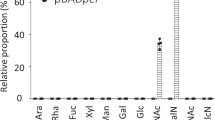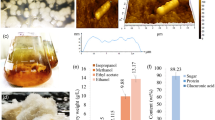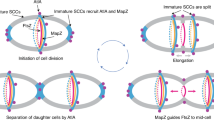Abstract
A PREVIOUS note1 described the stimulation of slime formation in the Enterobacteriaceae at room temperature by the addition of phosphate to the medium. When the phosphate was used at a concentration of 0.2 M, many organisms not usually recognized as possessing the property formed abundant slime, and those able to produce it without the addition of phosphate showed much heavier yields when phosphate was added. This work showed slime formation to be a widespread property in the Enterobacteriaceae although, under the conditions of culture ordinarily used, it is not usually manifested.
This is a preview of subscription content, access via your institution
Access options
Subscribe to this journal
Receive 51 print issues and online access
$199.00 per year
only $3.90 per issue
Buy this article
- Purchase on Springer Link
- Instant access to full article PDF
Prices may be subject to local taxes which are calculated during checkout
Similar content being viewed by others
References
Anderson, E. S., Nature, 190, 284 (1961).
Henriksen, S. D., Acta Path. Microbiol. Scand., 27, 107 (1950).
Henriksen, S. D., and Josephson, J. O., Acta Path. Microbiol. Scand., 28, 343 (1951).
Author information
Authors and Affiliations
Rights and permissions
About this article
Cite this article
ANDERSON, E., ROGERS, A. Slime Polysaccharides of the Enterobacteriaceae. Nature 198, 714–715 (1963). https://doi.org/10.1038/198714a0
Issue Date:
DOI: https://doi.org/10.1038/198714a0
This article is cited by
-
Polysaccharide of a Mucoid E. coli isolated from a Patient with Cystic Fibrosis
Nature (1968)
-
Zur Isolierung und qualitativen Bausteinanalyse der K-Antigene von Klebsiellen
Zeitschrift für Medizinische Mikrobiologie und Immunologie (1968)
-
Acidic Polysaccharide Antigens of a New Type from E. Coli Capsules
Nature (1963)
Comments
By submitting a comment you agree to abide by our Terms and Community Guidelines. If you find something abusive or that does not comply with our terms or guidelines please flag it as inappropriate.



